Thriving in Best Form
Creating — and maintaining — a safe, caring environment for the students and staff of NUS is a collective effort undertaken at all levels of the University.
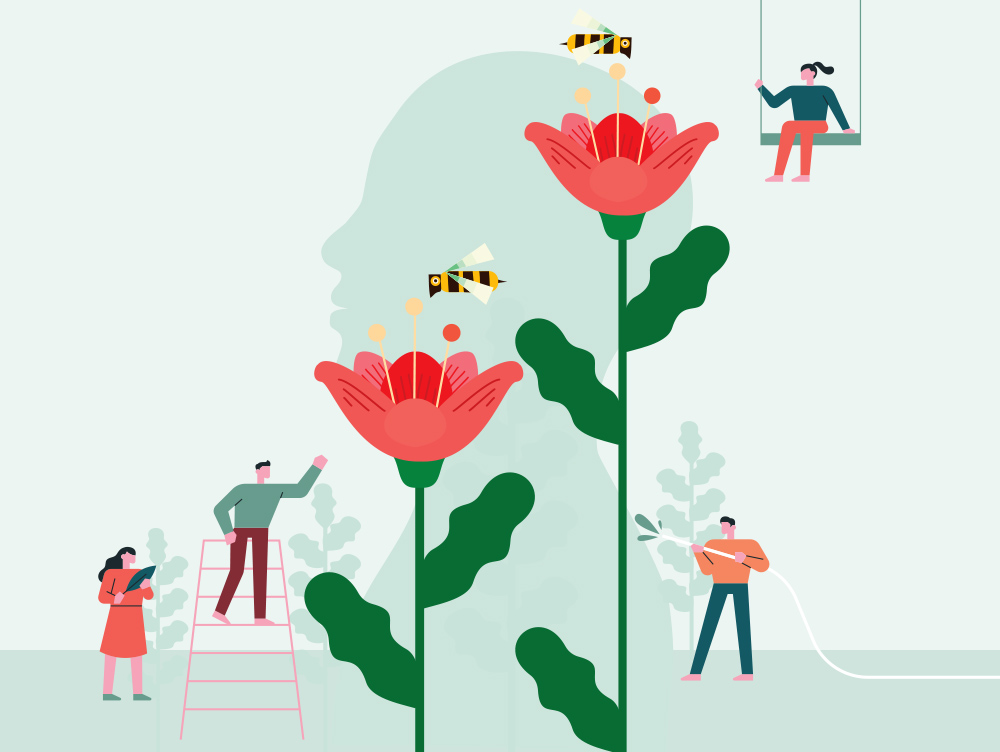
How do you remember your days at the National University of Singapore (NUS)? For many, it was a season brimming with youthful optimism; an exciting time of intellectual exploration and self-discovery. Yet for some others, it might have been a low period of feeling uncertain about future prospects, and being anxious over performance.
Ms Tasneem Abdul Majeed (Arts and Social Sciences ’23) recalls navigating university life as a freshman. Moving to a new campus, meeting new peers and adapting to a new way of learning all increased her anxiety levels. As a member of the University Scholars Programme, Ms Abdul Majeed was also required to stay on campus during her first year of undergraduate study. Immersed in an extremely social environment, and dazzled by myriad extra-curricular activities, the self-professed introvert found it a challenge to set boundaries. “I felt guilty about declining invitations to floor or house bonding events. I also struggled with overcommitment,” she recalls. “My parents, who were NUS students during the 1990s, were active in various student interest groups. I was inspired to do the same and enrolled in four interest groups — without considering the impact it would have on my mental wellbeing and academic performance.”
With high expectations of academic performance and commitments to co-curricular activities, and their own set of social dynamics — which are different from those of junior colleges or polytechnics — universities can be stressful environments. As a congregating ground for the brightest minds, a university environment presents an intense level of competitiveness on a high-calibre playing field. As one of the top universities in Asia, and placed eighth in the 2023
Quacquarelli Symonds World University Rankings, NUS certainly attracts the best: not just a global pool of academically-driven students vying to be accepted, but also top performers in different areas of work applying for job positions within the organisation. This means that the stressors are felt not just by students, but also by staff.
Studies from around the world, from Australia1 to the United Kingdom2, have shown an increasing proportion of members of university communities experiencing mental health issues. The social disruption caused by COVID-19 certainly took its toll. In 2022, it was reported in an National University Health System (NUHS) study that three in four NUS students were at risk of depression as a result of the pandemic. The findings echoed global reports on escalated feelings of depression among student populations who were abruptly cut off from campus community life during lockdowns — as well as similar feelings experienced by university workers.
While the world might have moved on from the pandemic, a newfound awareness of mental health issues has emerged. Mental health leave days and even counselling apps have been rolled out by employers to help staff manage their wellbeing. Some companies even offer flexi-work schedules and four-day workweeks in response to the masses’ call for better work-life balance.
Addressing the wellbeing of the working community is also a matter of economic importance. In April 2023, a study by Duke-NUS Medical School and the Institute of Mental Health found that anxiety and depression could cost Singapore around $16 billion yearly, with those affected missing an additional 17.7 days of work a year on average, and being 40 per cent less productive while at work.
Yet, initiatives and resources do not in themselves make a healthy environment. A four-day workweek on paper would be of little benefit if employees are still expected to respond to work messages and emails after office hours. The provision of ‘mental health leave days’ would lose its effect if a person still feels pressured by peers to forsake downtime for productivity. This is certainly a pertinent issue in Singapore, where the local culture still places value on visible, outward signs of industriousness, be it among working adults or the student population.
Creating a truly healthy work environment takes meaningful engagement, sustained efforts and a genuine culture of care. At NUS, these come naturally. After all, universities have more than a duty to educate — they also have a duty of care.
CARING FROM THE CORE
As a world-class organisation, NUS has been putting conscientious effort into creating and promoting a supportive and caring culture and community for both its student and working population — and this starts right from the university’s leadership core.
One of NUS’ strongest advocates for mental health is the Chairman of the NUS Board of Trustees, Mr Hsieh Fu Hua (Business ’74). Together with NUS President Professor Tan Eng Chye (Science ’85), they ensured that mental health became a strategic leadership priority within the University. They drove the formation of the NUS Health and Wellbeing (HWB) team, established under the Office of the President, in 2020. This was followed by the creation of the NUS Steering Committee on Mental Health & Wellbeing in June 2021. Chaired by the Deputy President of Administration, Mr Clarence Ti, the committee serves to provide oversight and guidance on the implementation of the University’s mental health strategy. Together, HWB and the committee look at consolidating and organising mental health resources and approaches to enhance the mental health and wellbeing of the NUS community. This is achieved via various modes, ranging from psychological clinical services, training, outreach and research to even the standardisation of measurement scales to assess the wellbeing of the NUS population.
While there have been siloed wellness initiatives that predate it, the setting up of HWB demonstrates a concerted effort to drive a holistic health and wellbeing strategy. Its formation cements the University’s commitment to enhancing the mental health and wellbeing of the entire NUS community, staff and students alike. “Universities, in general, focus on the wellbeing of students. NUS is one of the few that goes above and beyond this, and is kickstarting the journey to improve the wellbeing of academic, research, administration and executive staff,” shares Dr Andrew Epaphroditus Tay (Medicine ’05), Head and Director of the HWB team.
NUS has been recognised for its efforts. At the WorkWell Leaders Awards 2023, the university clinched the Wellbeing Organisation of the Year Award, while Prof Tan — who regularly invites staff from all levels to join him for casual chats during his daily morning walks — was bestowed the Wellbeing Leader Award for setting the tone and culture for building a mentally healthy workplace.
Further demonstrating their commitment to the cause, NUS senior leaders are also personally involved in two major health and wellbeing committees. These are the Mental Health Steering Committee that develops the University’s mental health strategy and ensures allocation of sufficient resources and budget; and the Healthy Campus Initiative that promotes a healthier lifestyle for the NUS population through changing eating habits and engagement in physical activities. Such involvement has contributed to regular and meaningful discussions on health and wellbeing matters at high-level meetings.

Universities, in general, focus on the wellbeing of students. NUS is one of the few that goes above and beyond this, and is kickstarting the journey to improve the wellbeing of academic, research, administration and executive staff.
Dr Andrew Epaphroditus Tay, Head and Director of the NUS Health & Wellbeing team
LEARNING TO HELP
Some courses available for NUS staff.

- Peer Staff Supporters undergo a two-day training programme. Thereafter, Peer Staff Supporters participate in sessions with a trained clinical psychologist every two months, and enjoy access to wellbeing workshops to level up on their peer supporter skills.
- Mental health literacy workshops are offered monthly for all staff. These range from hour-long presentations on topics such as mindful eating to half-day sessions on suicide alertness.
- Boost Your Psychological Capital is a two-day workshop curated by HWB to help individuals build resilience. Through scientifically proven positive psychology strategies, attendees learn how to handle work stressors, uncover personal strengths and bounce back from setbacks.
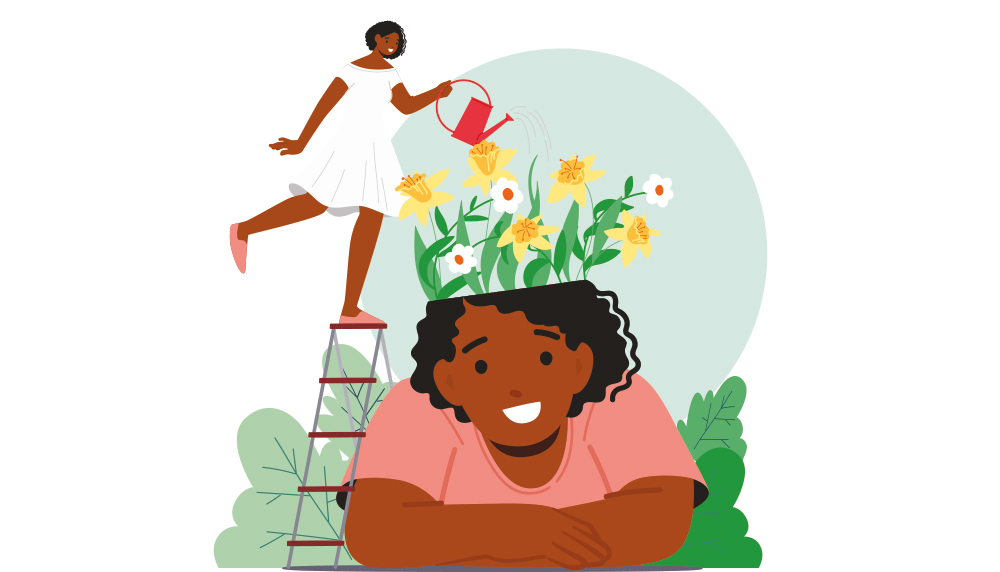
OF COUNSELLING… AND CATS
Taking a systematic approach to promoting mental health, the WellNUS framework was devised in 2021. It encourages organisations to start methodically plotting in each programme, initiative and wellbeing effort that caters to the needs of employees across the wellbeing spectrum: from a state of wellness to be maintained, and states that could be better managed through intervention and support, to recovery and back-to-work transition stages. This framework also serves as a gap analysis tool to identify areas for improvement and key stakeholders in charge of implementing change.
Dr Tay highlights that the framework is designed to ensure accountability in three areas: Culture and Leadership; Systems and Infrastructure; and Support Services and Resources. With this tool, NUS has been able to review organisation-wide programmes — a complementary package of long-term initiatives and ad hoc activations — to minimise duplication of efforts across stakeholders. “This has resulted in a much more unified, holistic, structured and sustainable approach to supporting employee wellbeing,” shares Dr Tay.
This translates to a 360-strategy, executed with high levels of professionalism. Tapping into the University’s in-house experts, Wellbeing Specialist Partners (WBSP) is a clinical arm that provides staff with evidence-based psychological services spanning counselling, free internal psychological support from a dedicated team of in-house NUS clinical psychologists, and group therapy. Based on their individual comfort level, staff also have the option of consulting with staff within the campus community, or seeking support through NUS' external vendor.
HWB also encourages staff to maintain and manage their wellbeing through additional forms of support and tools that help to build resilience. The latest iteration of NUSHeart (Help Employees with Advice, Resources & Therapy) — an Employee Assistance Programme by the NUS Office of Human Resources, and supported by HWB — is a perfect example of this approach. As of April 2023, the updated NUSHeart has contracted an external vendor to provide an engaging mobile app that covers a wide range of uses. Built into the app are personalised self-care and skill-building programmes, alongside a wealth of bite-sized wellness tips that make it an informative tool for everyday use. It also features functions such as booking face-to-face and virtual counselling appointments, alongside coaching sessions, helping to make periodic wellness check-ins hassle-free.
The NUSHeart app also demonstrates an effort taken to make information and resources as accessible as possible — a critical factor in the effectiveness of any programme. HWB’s mental health destigmatisation campaign was thus launched. Now into its third year and known as the (kind)mind campaign, it drives resource awareness and sets the tone for a culture of psychological safety and empathy on campus. This is done through panel discussions — with speakers including NUS alumni, senior leadership, students and staff — workshops and even a campus-wide digital game with prizes to be won.
Based on NUS’ 2022 Wellbeing Survey, the effect of the annual outreach campaign has seen an almost five-fold increase in the number of requests to utilise counselling services. The survey showed that — compared to those unaware of the campaign — staff and students who have been exposed to the campaign messages are increasingly willing to support people with a mental health issue. They also cited lower levels of distress and are more favourable towards using mental health resources and services. Since the destigmatisation campaign’s launch in 2021, there has been a decreasing trend in staff reporting extremely severe (from 4 to 3.79 per cent) and severe (8.3 to 6.9 per cent) signs of distress.

While campaigns are highly visible and attention-grabbing, normalising conversations on wellbeing takes constant effort, and multiple events have been organised to engage the campus population all year round, through different entry points. Not about to book a counselling session? How about a complimentary and confidential Health and Wellbeing Check-in to talk about what’s on your mind? If that’s not within your comfort zone, then consider an invigorating round of yoga to learn about ergonomic health instead. Or a “Paws-itive Mood Booster” session cuddling with felines and canines from Animal-Assisted Interactions Singapore while gaining actionable wellness take-aways. This year, HWB even collaborated with the Society for the Prevention of Cruelty to Animals (SPCA) for mindfulness and stretching sessions — while interacting with cats and kittens. While the main focus was on mindfulness and physical wellbeing, HWB also took the chance to get the SPCA to raise awareness about responsible pet ownership as a bonus.
Another initiative is the NUS Wellbeing Day. Launched in 2021 as an annual day-off for the whole campus to shut down to recharge as a community, it is now a twice-a-year event that sees staff and students getting that extra time away from school and work. “The idea behind NUS Wellbeing Day is that employees tend to shut down much better when they are doing it collectively," shares Dr Tay. "The impact of the NUS Wellbeing Days were huge, with data showing that employees were able to rest more than two times more effectively, compared to vacation days and weekends. This has been demonstrated by the precipitous drop of individual electronic traffic during NUS Wellbeing Days."
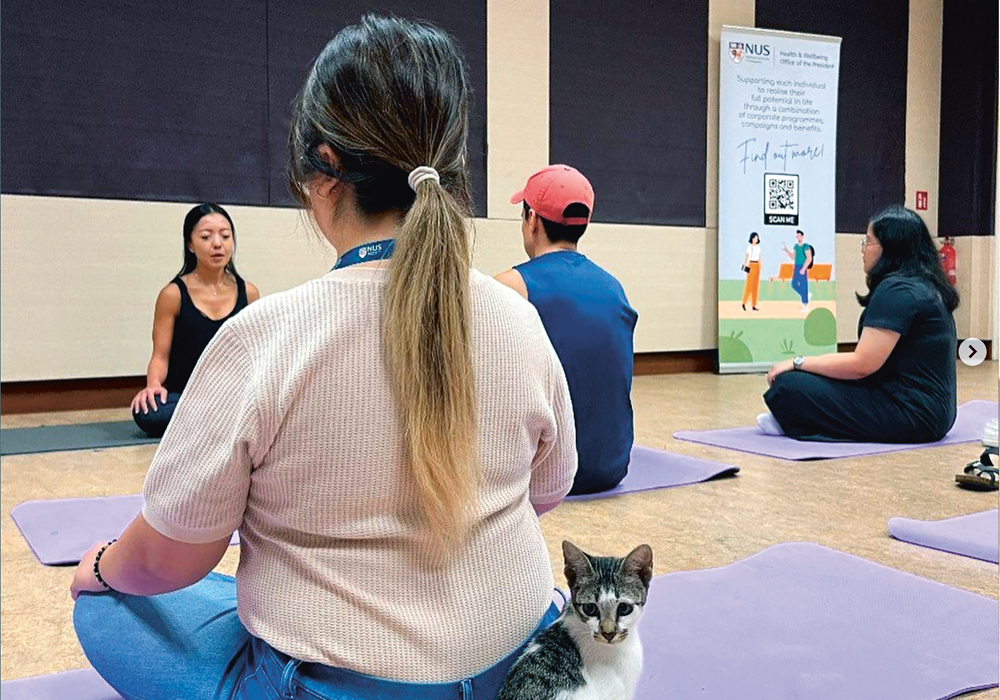 HWB collaborated with SPCA to organise a mindfulness breathing and stretching session with cats.
HWB collaborated with SPCA to organise a mindfulness breathing and stretching session with cats.
BETTER TOGETHER
For those ready to deep-dive into mental health issues — not just for their own benefit, but also to help others — NUS offers a full spectrum of education and training programmes. These range from hour-long awareness workshops held monthly, to two-day programmes for Peer Staff Supporters (PSS) Training.
The PSS system gives NUS staff with a passion for helping others the relevant training to help keep a lookout for colleagues in distress and offers them basic emotional support. PSS members also play the role of directing colleagues to the appropriate services and resources. A similar scheme — the PSS system by the Office of Student Affairs (OSA) — is mirrored for the student body.
Mr John Chng, Senior Associate Director, Student Wellness unit, OSA, shares the importance of having these “wellness agents” on the ground. “Through surveys, we have found that the first people a person in distress turns to are often their peers,” he reveals. “While there is much more mental health awareness today, there is still stigma among local and international students, who might have been brought up thinking that having such issues is a sign of weakness or even a matter of bringing shame to the family.” While neither counsellors nor mental health professionals, peer supporters play that first line of defence in safeguarding the wellbeing of the NUS community, simply by being that friend-next-door, or colleague that one can turn to. “We take mental wellness literacy training in students very seriously, and have been implementing such programmes since 2019,” says Mr Chng, who also shares that more than 700 students go through various forms of training each year to learn how to recognise distress signs among peers.

While there is more mental health awareness today, there is still stigma among local and international students, who might have been brought up thinking that having such issues is a sign of weakness or even a matter of bringing shame to the family.
Mr John Chng, Senior Associate Director, Student Wellness unit, NUS Office of Student Affairs
Ms Abdul Majeed was a Peer Student Supporter from 2022 to 2023. She says, “We underwent a rigorous six-month training programme on counselling techniques, peer support and crisis management to ensure that we were well-equipped to support students in distress. We were also well-supported by a team of experienced OSA staff, who helped address any concerns we had and made sure we had time for self-care to better support the student community.”
Besides the PSS initiative, there is also a full suite of health and wellbeing services and programmes aimed at the student population. University Counselling Services (UCS) under HWB ensures that students in distress have easy access to professional mental health support. In view of the students’ busy schedules, UCS even runs office hours sessions, and has streamlined services to the effect of reducing the waiting time for the first appointment by 60 per cent — so that help can be delivered sooner to those who need it.
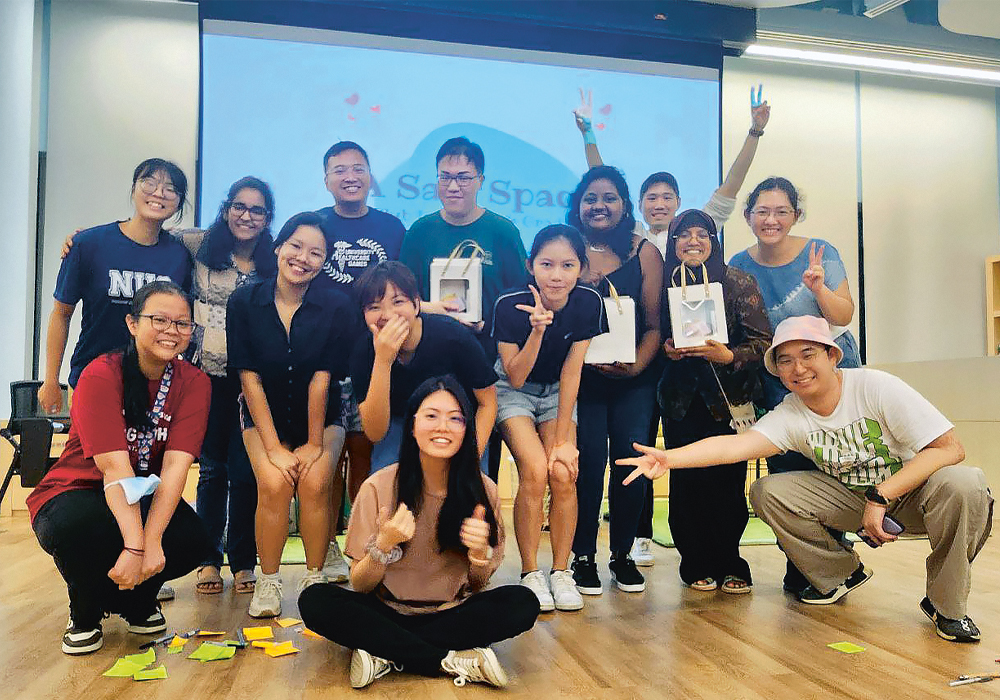 The latest batch of Peer Student Supporters at the PSS Induction 2023.
The latest batch of Peer Student Supporters at the PSS Induction 2023.
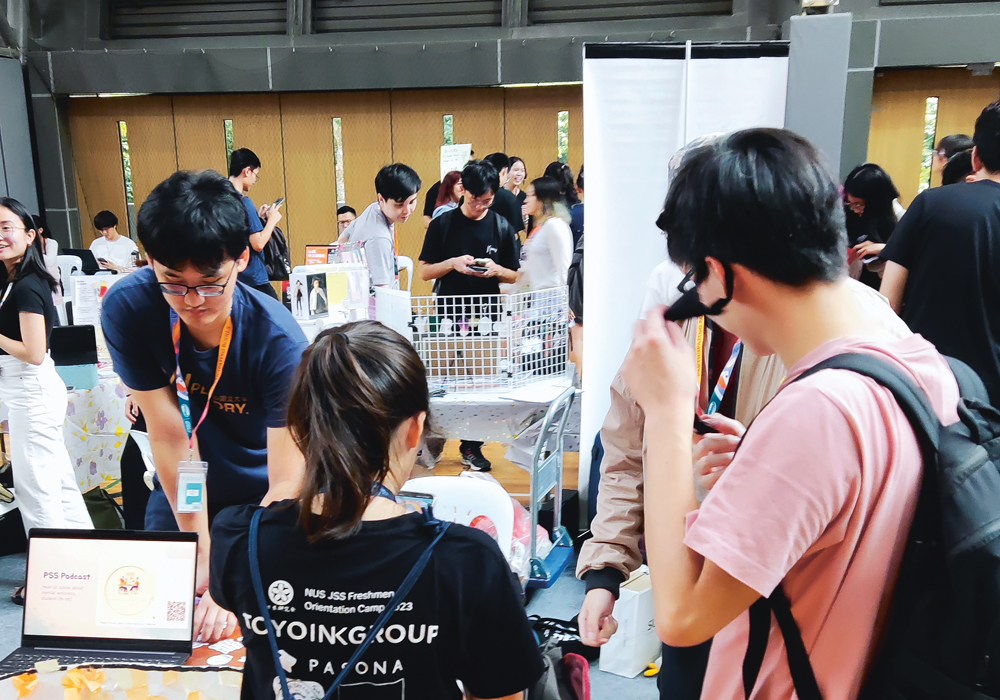 Peer Student Supporters at a booth at the Student Life Fair 2023.
Peer Student Supporters at a booth at the Student Life Fair 2023.
A Year 3 Business NUS student, who declined to be named, visited UCS in October last year. He was searching for NUS counselling services online, chanced upon UCS and booked an appointment. “I had a 1-to-1 consultation with a counsellor for about an hour and it was very helpful," he says. "The counsellor was professional and reassuring. They even checked in with me a month after my appointment to make sure I was okay, and told me that I could always visit them again if I had any concerns.”
Also part of the support infrastructure are Faculty Student Support Managers (SSMs). Since 2017, some 40 to 50 SSMs who are trained to provide social and emotional support to students have been appointed. “They serve as a port of call for students who are facing mental health issues and could help to facilitate certain academic arrangements, such as the pushing back of deadlines or reducing workloads by delaying modules,” explains Mr Chng.
As of 2019, NUS has also appointed trained counsellors and social workers as Student Wellness Managers (SWMs) on campus and Residential Wellness Managers (RWMs) in hostels from mid-2022. SWMs complement SSMs in identifying students at risk, and connect them to appropriate services such as UCS for further assistance if needed. “Whether it be relationship problems or mental health conditions, students from faculties and hostels are appreciative of the help and support rendered by the Wellness Managers,” says Mr Chng.
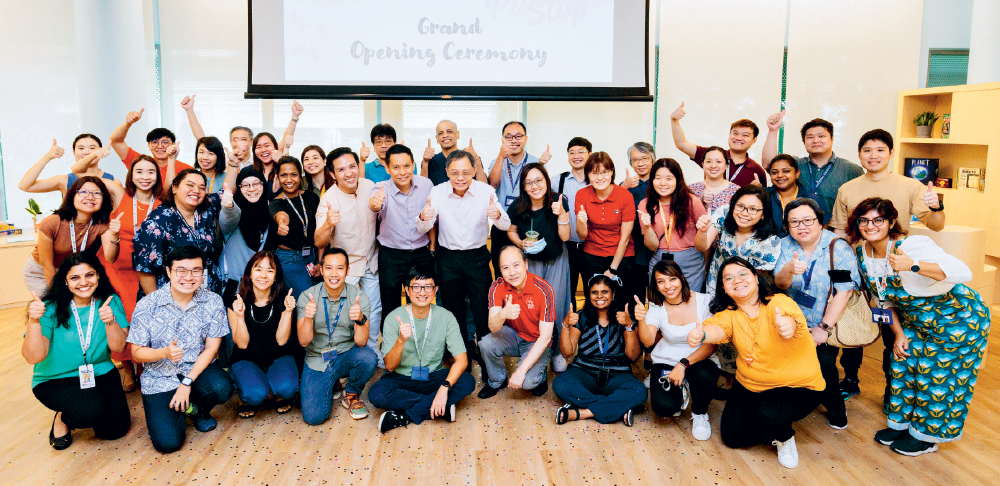 Staff at the opening of PitStop@UTown.
Staff at the opening of PitStop@UTown.
The Wellness Managers are positioned close to student life to build trusting relationships and to “brand mental health as something approachable and accessible,” shares Mr Chng. “While we are all trained counsellors and social workers, we do not take our interactions with students as a ‘counselling’ session. We are just there as somebody who they can talk to, and we kind of do an initial assessment. If a student presents severe symptoms, we try to build a relationship with them in the hope that we might be able to encourage them to go for the University’s professional counselling services.”
![]()
Many students do know the importance of mental health as part of the whole NUS journey. However, we want to encourage them to prioritise their mental wellbeing, rather than start thinking about it only when they face issues.
Mr John Chng, Senior Associate Director, Student Wellness unit, NUS Office of Student Affairs
 Residential Wellness Manager Orientation 2023.
Residential Wellness Manager Orientation 2023.
Moving beyond providing students with essential services, the Student Wellness unit takes things upstream with the WellNUS Festival, co-organised with the University Health Centre and in partnership with HWB. First launched in 2020, this month-long event held in conjunction with World Mental Health Day on 10 October is a campus-wide activation packed with interest-based activities and informative virtual talks. “For that whole month, we would collaborate with student clubs and faculties alike to conduct activities such as kayaking, music box making, and latte art. The focus, however, is on wellness,” details Mr Chng. “Many students do know the importance of mental health as part of the whole NUS journey. However, we want to encourage them to prioritise their mental wellbeing, rather than start thinking about it only when they face issues.” These craft workshops and fitness sessions are a reminder for them to engage in activities that can help them reset and recalibrate body and mind.
Kenric Tan (Year 4, Nursing) participated in the WellNUS Festival last year. He says, “It was an opportunity to explore crafts and practices that I had never tried before and take a short break from school to recharge!” He also believes in OSA’s “7 PitStop Principles” — Personal Skills, Interactions, Time Out, Sleep, Thoughtful Eating, On the Move and Purpose — positive practices that students can adopt to help with stress management and improve self-care. “I would encourage [my friends] to practice the Pitstop Principles or to even regularly share their thoughts and feelings so they will not be bottled up," he adds.
Ms Abdul Majeed adds that wellness reminders were apparent throughout the NUS campus. “Taking the campus bus, I would pass banners advertising the University's free counselling services and events promoting mental wellness on campus such as mindfulness workshops.”
BEYOND HAPPINESS — HELPING STUDENTS BUILD RESILIENCE
It’s not just all good vibes and sunshine though. Pointing to “happiness rankings” among universities, which one might find online, Mr Chng stresses that a “happy” student body doesn’t necessarily translate to wellness. “Wellbeing is a lot of things, from a sense of belonging and feeling of security, to being appreciated. It is not just about staying happy all the time,” he opines. While some might argue that a more relaxed teaching structure — as opposed to an intensely rigorous education system — could significantly reduce the stress students experience, Mr Chng differs. “Indeed, a competitive culture can have an impact on our students’ wellbeing, to the point where they might be unable to perform at their optimal level. However, academic excellence and wellness are not at opposite ends.” Having spoken with peers from top universities such as Oxford and King’s College, he found that the more highly-ranked a university is, the stronger the support structure for students who are distressed. “More importantly, it’s also about having the mental resilience to pick oneself up after failure, or a period of feeling down,” says Mr Chng. He opines that what is more critical is a university environment that allows students to flourish in their own way by allowing them to fail, and by celebrating different successes.
Mr Chng’s sentiments echo what Prof Tan shared in a July 2023 interview with Channel NewsAsia
3: “We feel that in a university, we should allow our students to experience failure, hopefully in a more controlled environment… and they learn from it, pick themselves up, and continue to push forward.” The flagship NUS Overseas Colleges programme alongside internships all serve to expose students to experiential routes of learning outside of the classroom. “They might see the startup (that they are attached to) doing extremely well in the first half of the year, and in the second half, see it collapse," adds Mr Chng. "It makes them think about how things might be if they were actually working there, and suddenly found themselves without a job.” Witnessing and going through such real-world failures can help students mentally steel themselves against such experiences in the future.
LIVING IT. LOVING IT.
Creating a vibrant campus experience for better health and wellbeing.
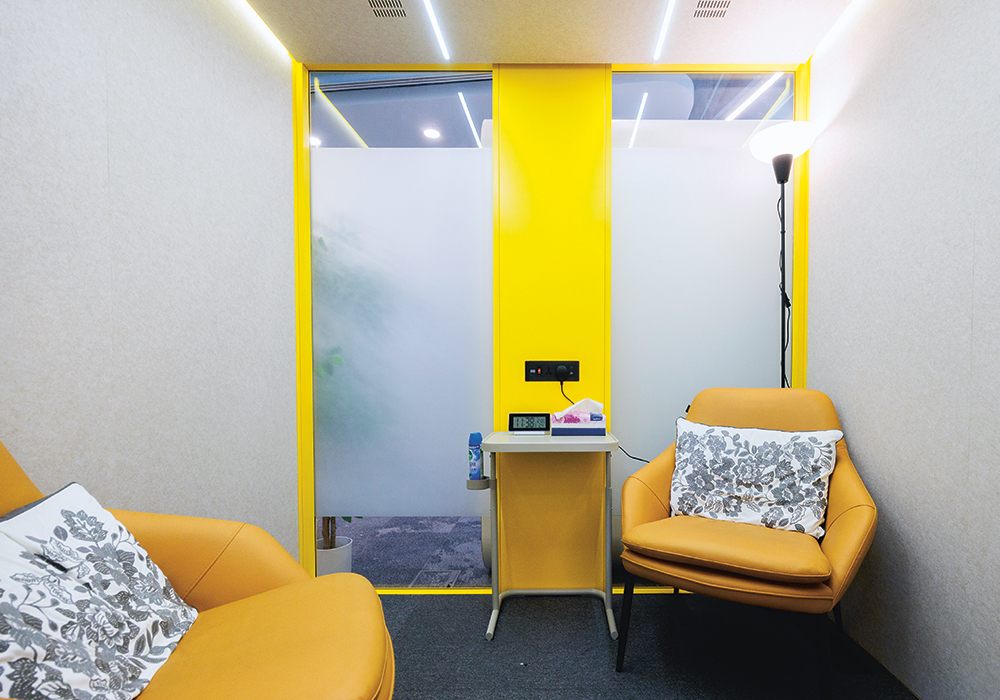 Chatting Pods at PitStop.
Chatting Pods at PitStop.
PITSTOP: Decked with massage chairs and foosball tables, and kitted with boardgames, these public areas located at UTown, and within the Science, College of Design and Engineering, Dentistry and Law faculties, are dedicated to student mental wellness. Here, students are invited to relax and chat with peer supporters and Student Wellness Managers on duty. “We market PitStop as a friendly place where anybody can go just to destress,” says Mr Chng. “Apart from gyms and running tracks for working out, students appreciate this pocket of recreational space where they can talk about wellbeing.”
NUS STUDENTS’ SPORTS CLUB: This club caters to the recreational needs of students through its 18 member clubs spanning martial arts, water, land and indoor sports. Through Sports Club projects such as NUS Biathlon, SunNUS, NUS Sports Camp, RunNUS and Inter-Faculty Games, it further promotes a healthier lifestyle campus-wide, and allows the NUS population to enrich their university experience with an array of sporting activities.
CENTRE FOR THE ARTS (CFA): Committed to enriching student life by creating a vibrant, inclusive space for experiencing the arts, CFA has overseen key arts activities on campus — from festivals and carnivals, to the ExxonMobil Campus Concerts, film screenings, live music performances and even improv theatre acts — since 1986.
CENTRE FOR MUSIC AND HEALTH (CMH): Established by NUS Yong Siew Toh Conservatory of Music and launched in 2023 to advance the use of music for health and wellbeing, CMH is the first of its kind in Southeast Asia. While primarily a research centre, CMH has also organised events such as Movin’ & Groovin’ for Wellness, a music and dance programme held in June 2023 in collaboration with National Gallery Singapore, to promote wellness and creative expression.
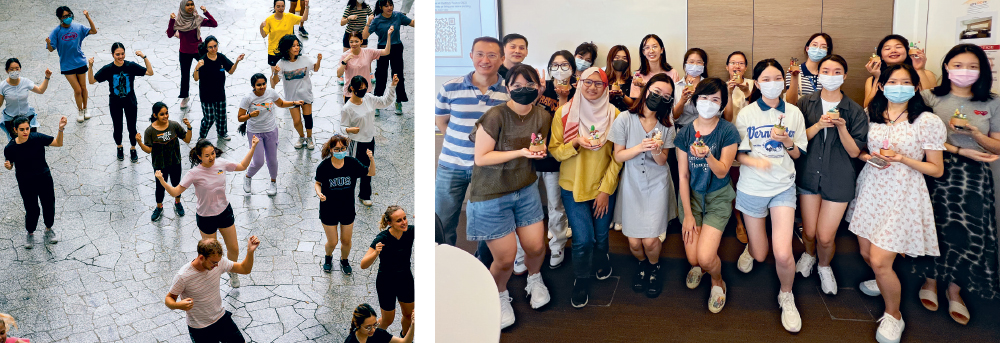 Activities at the WellNUS Festival included a fitness class and a relaxing session to craft a musical box.
Activities at the WellNUS Festival included a fitness class and a relaxing session to craft a musical box.

Taking the campus bus, I would pass banners advertising the University's free counselling services and events promoting mental wellness on campus such as mindfulness workshops.
Ms Tasneem Abdul Majeed (Arts and Social Sciences ’23)
A KINDER EXPERIENCE FOR ALL
Mr Chng shares that the 2023 Student Life survey showed that rates of anxiety, depression and perceived stress have fallen as compared to the years before, indicating that mental wellbeing is better among the student population. “There are a lot of factors that contribute to this — one of it being the resumption of face-to-face sessions post-pandemic, leading to positive social interactions,” he shares. “I like to think that our proactive approach in reaching out has also helped.”
Apart from university-directed efforts, there are also ground-up movements with considerable impact. Under the Healthy Campus Initiative (HCI) administered by HWB, undergraduates can apply for funding and mentorship for health and wellbeing projects. Mr Chng also shines the spotlight on projects such as Spectrum, a student-led mental health movement that centres on the belief that mental health falls on a continuum, which won the 2020 NUS Public Health Challenge. This competition invites NUS students across faculties to propose ground-up solutions that can improve the health of the NUS community. Other initiatives have even attracted the attention of those beyond NUS. One example is I am Friendly Co, an anonymous platform where any youth or young adult can seek emotional support from trained listeners, which was started by NUS undergraduates. The platform is supported by NUS Enterprise and the People’s Association Youth Movement, among other organisations.
Beyond these headline-grabbing projects, there are also myriad student groups — be it mental health advocacy groups within hostels, or student committees — coming together to create awareness events. At the end of the day, just as managing and maintaining one’s physical and mental wellbeing lies on a continuum, so does NUS’ journey in building a healthy and kind campus community. “NUS is a large community with a long legacy — it will take time to change the mindset and culture university-wide, inside out,” says Dr Tay. “However the NUS community has been open-minded and many have embraced change. As a whole university, we are working together to make bigger strides for a more supportive and caring environment.”
![]()